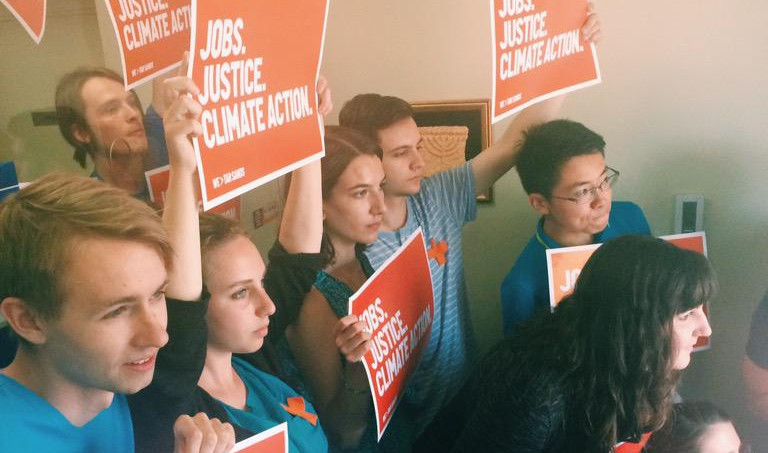Chip in to keep stories like these coming.
Almost a month go, the CYD gathered in person to get to know each other, and to talk about our strategies for COP 21 in Paris. Inevitably, the election pervaded discussions about the upcoming UN climate negotiations: “What will a new (or not) government mean for the climate?” Our personal Facebook and Twitter feeds have been bursting with relevant articles on Prime Minister Harper’s abhorrent treatment of Indigenous peoples, of his suppression of voters, and of his government’s assault on science.
According to the polls, we will see Stephen Harper ousted on October 20 and Justin Trudeau become Canada’s new Prime Minister. Harper, the man we have been rallying against with increasing intensity for an entire decade, will be relegated to sit in opposition or leave the House of Commons entirely.
While the CYD is thrilled at the prospect of Harper’s departure, we know that holding a new government accountable to its climate promises will be challenging. We will encounter fewer explicit barriers, and perhaps our demands will reach more attentive ears; but the systems and attitudes that produced Stephen Harper’s decade in power remain. The government might be different after October 19, but, when it comes to climate action, we can’t assume that anything will change.
A newly elected Prime Minister will inherit Harper’s legacy: a governing and regulatory system skewed to support the expansion of the tar sands, a militarized police force, an ideologically deployed, uninhibited intelligence body, severely compromised research stations, especially in the Arctic, raging forest fires instigated by a changing climate, and drastic violations of Indigenous communities, including the disproportionate exposure of First Nations to higher rates of serious diseases incontrovertibly linked to the tar sands.
In any scenario, a new prime minister will try to set the tone that he can be different, bring change to Canada, and that we will live happily ever after. This tone will include the rhetoric of climate justice, but we’re more likely to see continued disregard for ambitious fact-based policy making, perhaps on a less vigorous, but no less intolerable scale, than under Harper’s government. The prime minister will meet with the provinces, encouraging them to step up to climate action while shirking federal commitments to meaningful emissions reductions strategies and targets. He will probably avoid the challenging but vital conversations we need to have in order to prompt a justice-based transition to a clean economy — which must include reconciliation with Indigenous peoples at its core.
It’s important to pause here to mention that the Green Party supports the implementation of the UN Declaration on the Rights of Indigenous Peoples, a full inquiry into missing and murdered Indigenous women, and other pathways towards reconciliation. The Liberal Party also pledges in its platform to enact the recommendations of the Truth and Reconciliation Commission, and to “close the funding gap and improve outcomes for First Nations students” by investing in programs from kindergarten to grade 12. It is the NDP, however, that received the support of the Assembly of First Nations earlier this month, after both after both Tom Mulcair and Justin Trudeau addressed the Assembly in June.
With a Liberal minority looking increasingly likely, it was disappointing to to learn of the news that Liberal’s national campaign co-chair, Dan Gagnier, sent emails to TransCanada officials advising them on how to lobby a new government, quickly targeting the right people in order to ensure the planned “in-service” dates of the proposed Energy East pipeline aren’t jeopardized. Mr. Gagnier resigned in the wake of the emails becoming public, but what’s clear is that we cannot expect meaningful climate action as part of the “Real Change” that Mr. Trudeau has promised. With an end to the Harper era in sight, we are already being warned by scandals just like this one that middle of the road liberalism poses a different kind of threat to climate justice.
Friends of the CYD held Trudeau publicly accountable for his party’s actions in Halifax on Saturday, interrupting a Liberal rally with banners that read, “Your climate policy is just not ready” and “Liberals in bed with TransCanada.”
You might feel like your vote on Monday will not contribute to bringing change to the House of Commons. Or you might be so overjoyed at the prospect of a Harper-free governing party that you overlook Tom Mulcair’s stance on pipelines, particularly Energy East, and the fact that Justin Trudeau has refused to commit to commit to specific emissions reduction numbers. Both leaders have pledged to attend COP21 should they become Prime Minister; we look forward to meeting Canada’s next prime minister there.
It is not our intention to dishearten readers of this blog post! Rather, it is our explicit commitment to you that on October 20, members of the Canadian Youth Delegation will get up, refocus, and renew our efforts to hold Canada’s new government accountable to its election promises and far beyond.
We are inspired by those around us standing up every day for their rights, their values, and for what they love, despite the cost. Regardless of who is elected on Monday, we are excited to welcome new MPs in the weeks after the election, reminding them that we elected them, that they are beholden to their communities, and that their constituents are standing for climate justice.
On November 5, we will give the federal government a Climate Welcome in Ottawa. The pressure on world leaders in Paris is mounting. This election is the urgent call to action for which we have been preparing.
See you on Monday at the polls, and see you on the streets taking action for a better future.
Chip in to keep stories like these coming.
Image: Twitter/@CYD_DJC



